Climate and Weather in Wilāyat-e Nīmrōz, Afghanistan
Wilāyat-e Nīmrōz, located in the southwestern part of Afghanistan, experiences a unique climate due to its geographical location and topography. The province is bordered by Iran to the west and Pakistan to the south, with the Hindu Kush mountains to the north. This combination of factors creates a diverse climate with distinct weather patterns throughout the year.
Seasonal Overview:
Wilāyat-e Nīmrōz has four distinct seasons: spring, summer, autumn, and winter. Each season brings its own set of weather conditions and temperature variations.
Spring (March to May):
During spring, the weather in Wilāyat-e Nīmrōz starts to warm up after the cold winter months. The average temperature gradually rises from around 18°C (64°F) in March to 30°C (86°F) in May. Spring is generally a dry season with minimal rainfall. However, occasional dust storms and strong winds can occur, especially in April.
Summer (June to August):
Summer in Wilāyat-e Nīmrōz is characterized by hot and dry weather. The average temperature reaches its peak during this season, with temperatures often exceeding 40°C (104°F) in July and August. The province receives very little rainfall during summer, and the arid conditions contribute to the desert-like landscape. It is essential to stay hydrated and take necessary precautions to protect oneself from extreme heat.
Autumn (September to November):
Autumn brings relief from the scorching summer heat as temperatures gradually start to drop. The average temperature ranges between 25°C (77°F) in September to 15°C (59°F) in November. This season is relatively dry, with minimal precipitation. The landscape begins to change, with the leaves of deciduous trees turning vibrant shades of red, orange, and yellow.
Winter (December to February):
Winter in Wilāyat-e Nīmrōz is characterized by cold temperatures and occasional snowfall, particularly in the mountainous areas. The average temperature ranges from 5°C (41°F) in December to 12°C (54°F) in February. Nighttime temperatures can drop below freezing, so it is important to dress warmly. The province experiences relatively low levels of rainfall during winter.
Precipitation:
Wilāyat-e Nīmrōz is known for its arid climate, with low annual rainfall. The province receives most of its precipitation during the winter months, primarily in the form of snowfall in the higher elevations. On average, the region receives around 100-150mm (4-6 inches) of rainfall per year. The scarcity of rainfall contributes to the desert-like conditions and limited vegetation in the area.
Extreme Weather Events:
While Wilāyat-e Nīmrōz generally experiences a stable climate, there are occasional extreme weather events that can affect the region. Dust storms, also known as haboobs, can occur during the dry seasons, particularly in spring, resulting in reduced visibility and strong winds. Flash floods can also occur during the rare instances of heavy rainfall, leading to potential damage to infrastructure and agricultural land.
Conclusion:
Wilāyat-e Nīmrōz, Afghanistan, has a unique climate characterized by hot and dry summers, cold winters with occasional snowfall, and minimal rainfall throughout the year. The province's arid conditions and desert-like landscape contribute to its distinct weather patterns. Understanding the climate and weather conditions in Wilāyat-e Nīmrōz is essential for residents and visitors to adequately prepare for the different seasons and to ensure their safety and well-being.
A - Nimroz's Latitude is 31.000000 & Longitude is 62.500000.
A - Weather in Nimroz is 37° today.
A - Climate Conditions in Nimroz shows clear sky today.
A - Humidity in Nimroz is 7% today.
A - Wind speed in Nimroz is 3.78 km/h, flowing at 45° wind direction. today.
